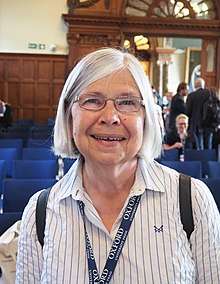Gillian Clark (historian)
Edith Gillian Clark FBA is Emeritus Professor of Classics and Ancient History at the University of Bristol.[2] She retired from the University of Bristol in 2010. Clark has made a significant contribution to the history, literature, and religion of late antiquity.
Gillian Clark | |
|---|---|
 Clark in August 2019 | |
| Nationality | British |
| Other names | Edith Gillian Clark |
| Spouse(s) | Stephen R. L. Clark |
| Academic background | |
| Alma mater | Somerville College, Oxford |
| Thesis | Augustus and the Historians[1] (1973) |
| Academic work | |
| Discipline |
|
| Institutions | University of Bristol |
| Main interests | Late antiquity |
She is currently working on a commentary of Augustine of Hippo's City of God, under contract with Oxford University Press. She is a Fellow of the British Academy and an editor for the Translated Texts for Historians 300–800 series, published by Liverpool University Press.[3] She is editor of the monograph series Oxford Early Christian Texts, published by Oxford University Press. An event, "Christianity and Roman Society: A Colloquium for Professor Gillian Clark", was held in her honour in 2011 at the University of Bristol and a Festschrift was published in 2014 as a result.[4]
Clark studied Greek and Latin language and literature, ancient history, and philosophy at Somerville College, Oxford. She received her Master of Arts and Doctor of Philosophy degrees from the University of Oxford. She has taught at the universities of Glasgow, St Andrews, Manchester, Liverpool and Bristol.[5]
Selected bibliography
- Monica: An Ordinary Saint (New York: Oxford University Press, 2015)
- Being Christian in Late Antiquity: A Festschrift for Gillian Clark, edited by Carol Harrison, Caroline Humfress, and Isabella Sandwell (Oxford: Oxford University Press, 2014)
- On Abstinence from Killing Animals (London: Bloomsbury, 2014)
- Late Antiquity: A Very Short Introduction (Oxford: Oxford University Press, 2011)
- Body and Gender, Soul and Reason in Late Antiquity (Farnham: Ashgate, 2011)
- Christianity and Roman Society (Cambridge : Cambridge University Press, 2004)
- Philosophy and Power in the Graeco-Roman World: Essays in Honour of Miriam Griffin, edited by Gillian Clark and Tessa Rajak (Oxford: Oxford University Press, 2002)
- Confessions. Books I–IV (Cambridge : Cambridge University Press, 1995)
- Augustine: The Confessions (Cambridge : Cambridge University Press, 1993)
- Women in the Ancient World (Oxford: Oxford University Press, 1989)
References
- Clark, Edith Gillian (1974). Augustus and the Historians (DPhil dissertation). Oxford: University of Oxford. OCLC 43092152.
- "Professor Gillian Clark". research-information.bristol.ac.uk. Retrieved 3 July 2016.
- "series-Translated-Texts-For-Historians". Liverpool University Press. Retrieved 3 July 2016.
- "Christianity and Roman Society: A colloquium for Professor Gillian Clark, Bristol University".
- "Professor Gillian Clark". British Academy. Retrieved 3 July 2016.